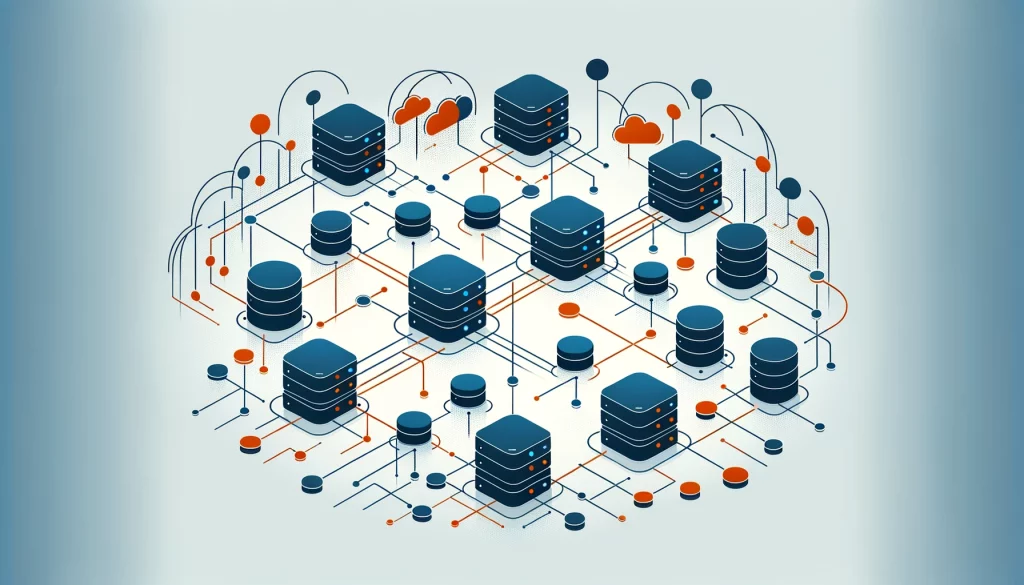
Distributed Data Management

Distributed data management is a crucial aspect of modern organizations. It involves the efficient control and management of data ingestion, storage, organization, and maintenance across an organization.
Management is important for creating effective data governance systems. These systems support applications and provide valuable insights for strategic planning and decision-making.
What is Distributed Data Management?
DDM is a function in an operating system. It helps applications and users access data stored in databases on remote systems easily. The system must connect to a communication network to utilize DDM, and remote systems must also support DDM.
With DDM, users and applications can:
- Access data files on both local and remote systems
- Handle data records in files located on target systems
- Manipulate data on remote systems
DDM ensures processing files in the same way is possible, whether they are on your computer or elsewhere. This means you can easily work with data no matter where it is.
The Importance of Effective Data Management
Effective data management practices are vital for organizations to make informed business decisions. By properly managing data, companies can improve marketing campaign performance, optimize business operations, and reduce costs.
Not managing data properly can cause problems like data silos, inconsistent data, and data quality issues. This can make it difficult for an organization to use business intelligence and analytics effectively.
Data management is becoming more important because of new rules about protecting data, like the GDPR and CCPA.
Compliance with these regulations requires robust data management practices.
The Data Management Process
The data management process involves a combination of functions that ensure stored data is accurate, available, and easily accessible.
Engineering and data management teams do most of the work. Users also play a role in ensuring the data meets their needs and follows usage policies.
The first step in effective distributed data management is developing a data architecture. This is particularly important for large organizations with vast amounts of data to manage.
A well-designed architecture provides a model for databases and other data platforms, guiding the deployment of specific technologies to suit individual applications.
The Role of DDM in Data Governance
DDM plays a crucial role in implementing data governance systems. Data governance encompasses the policies, procedures, and practices that ensure the quality, consistency, and security of data.
By enabling efficient data management across distributed systems, DDM supports the implementation of data governance policies and helps maintain data integrity.
Effective data governance through DDM allows organizations to:
- Ensure data consistency and accuracy across systems
- Implement data security measures to protect sensitive information
- Comply with data privacy regulations
- Facilitate data sharing and collaboration among teams
- Improve decision-making
Benefits of Distributed Data Management
Implementing DDM offers several benefits to organizations, including:
- Improved data accessibility: DDM allows users and applications to access data from both local and remote systems, enhancing data accessibility and facilitating collaboration.
- DDM helps maintain data consistency by managing data across distributed systems, reducing the risk of data silos and inconsistencies.
- Enhanced data security: enables organizations to implement data security measures across distributed systems, protecting sensitive information from unauthorized access.
- Better compliance: organizations can ensure compliance with data privacy regulations by enforcing consistent data management practices across systems.
- Enhanced decision-making: organizations can make better choices by using accurate and trustworthy data.
Challenges in Implementing DDM
While DDM offers numerous benefits, implementing it can also present challenges, such as:
- Complexity: Managing data across distributed systems can be complex, requiring careful planning and coordination.
- Integration: Integrating with existing systems and processes can be challenging, particularly in large organizations with legacy systems.
- Security: Ensuring data security across distributed systems requires robust security measures and ongoing monitoring.
- Skill: To use and control DDM, you would need special skills. Companies might have to train or hire experts.
The Future of Distributed Data Management
As organizations use more and more data, the need for distributed data management will keep increasing. The future of DDM depends on using new technologies and creating better ways to manage data.
The Role of Artificial Intelligence and Machine Learning
Artificial Intelligence (AI) and Machine Learning (ML) will play a crucial role in managing data in the future. These technologies can automate different parts of managing data, like finding data, checking data quality, and governing data.
AI and ML algorithms can analyze large amounts of data from different systems. They can detect patterns and anomalies that might signal potential data quality problems or security breaches. By automating these processes, organizations can save time and resources while improving the accuracy and reliability of their data management practices.
The Emergence of Edge Computing
Edge computing is another trend that is likely to shape the future of distributed data management. Edge computing processes data near the location where it gathers it. This is done by processing it locally instead of transporting it to a central data center.
This method can reduce delay and increase data processing speed. It is important for applications that require instant data processing, such as IoT devices and self-driving cars.
Edge computing can assist organizations in efficiently managing and processing data across distributed systems in the realm of distributed data management. Organizations can process data closer to its source. This reduces the amount of data sent over networks. As a result, things become faster and cheaper.
The Importance of Data Governance Frameworks
As organizations generate and rely on increasing amounts of data, the significance of data governance frameworks will also grow. Data governance frameworks provide a set of policies, procedures, and standards for managing data across an organization.
In the context of distributed data management, data governance frameworks are essential for ensuring data consistency, quality, and security across distributed systems. Data governance frameworks help organizations manage data effectively by defining clear roles and responsibilities for data management.
The Need for Skilled Data Management Professionals
As managing distributed data becomes more complex, the demand for skilled data management professionals will keep rising. Professionals in data management are crucial for creating, executing, and maintaining distributed data management systems.
This includes data architects, data engineers, and data scientists. Data architects design the structure of the data system. Data engineers build and implement the data system. The latter analyze and interpret the data.
Companies should spend money on training programs to meet the increasing need for skilled data management workers. This will help enhance the skills of their current employees. They may need to hire new talent with the right skills and experience to effectively manage distributed data systems.
The Importance of Collaboration and Communication
Finally, the future of distributed data management will depend on effective collaboration and communication across teams and departments. Different systems and locations spread out the data. Teams need to collaborate to maintain consistent and efficient data management. Collaboration is crucial in this process.
Organizations must create an environment where teams collaborate and communicate effectively. They need to share information and discuss the best ways to handle data in various systems. Organizations can ensure effective and efficient management of data across the organization by breaking down silos and promoting cross-functional collaboration.
Conclusion
Distributed data management is a critical aspect of modern organizations, enabling efficient control and management of data across distributed systems.
By implementing DDM, organizations can improve data accessibility, maintain data consistency, enhance data security, ensure compliance, and support decision-making.
However, implementing DDM also presents challenges, such as complexity, integration, security, and skill requirements. To succeed with DDM, organizations need to plan carefully, coordinate well, and have skilled professionals.
